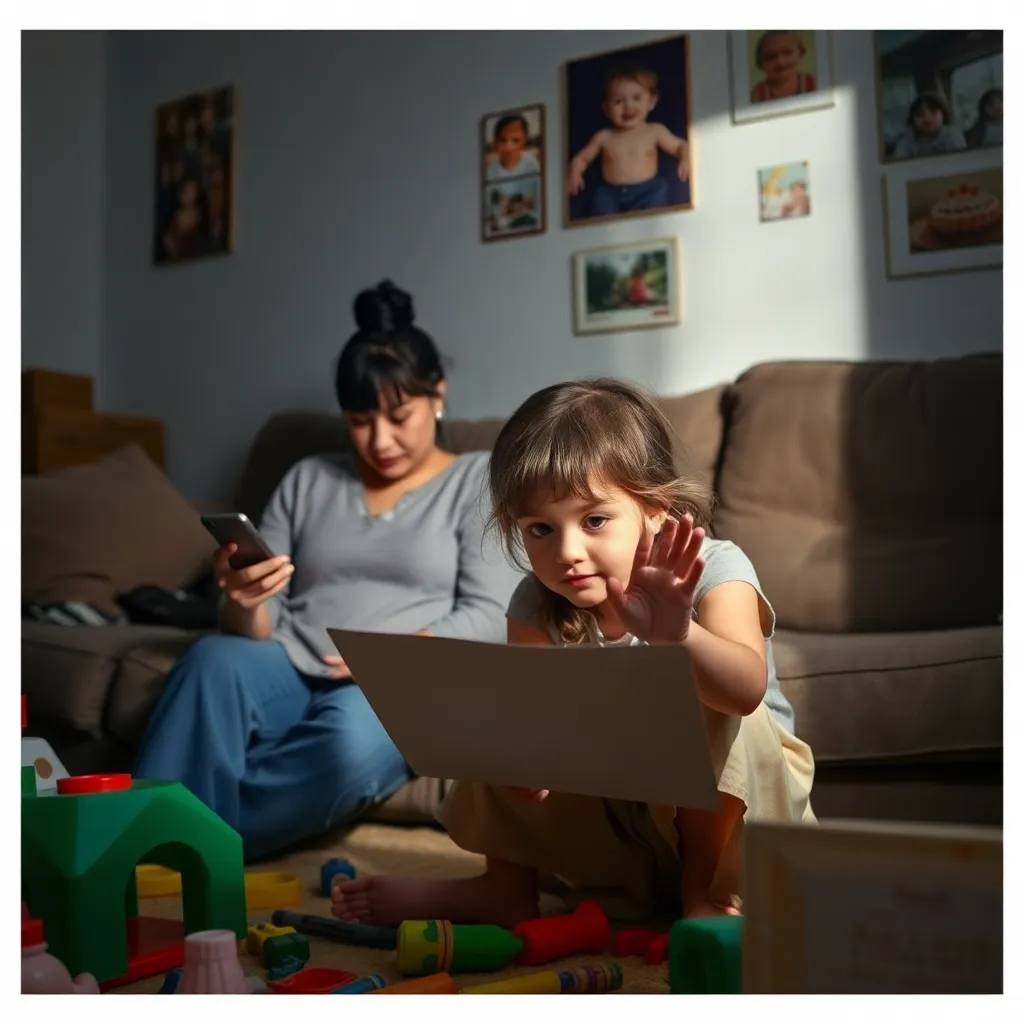Parenting is a journey filled with love, challenges, and the constant desire to do right by your children. Yet, even the most well-intentioned parents can sometimes fall into patterns that unintentionally exploit their children, often without realizing the impact. This topic is both delicate and crucial, as recognizing these behaviors is the first step toward nurturing a healthier family dynamic. By understanding these subtle behaviors, you can create a more supportive environment that respects and empowers your child’s individuality.
It’s important to remember that nobody is perfect, and awareness is a powerful tool for change. In this article, we’ll explore nine common behaviors that may be harming your child, offering insights to help you reflect and grow. Each behavior will be discussed in detail, highlighting how it manifests and the potential impact it can have on your child’s well-being. Armed with this knowledge, you can make informed choices that prioritize your child’s emotional and mental health.
1. Recognizing Exploitative Parenting Traits

When it comes to recognizing exploitative parenting traits, subtle behaviors can often go unnoticed. Parents might unintentionally leverage their children’s achievements to boost their own self-esteem, creating an emotionally taxing dynamic for the child.
Consider a scenario where a parent constantly pressures their child to excel in activities simply to gain bragging rights among peers. This behavior can lead the child to feel as though their worth is tied solely to their accomplishments, rather than being loved for who they are.
Experts often highlight the importance of acknowledging these patterns early. Dr. Jane Smith, a renowned child psychologist, notes that children in such environments may struggle with self-identity and emotional well-being long-term.
To foster healthier relationships, parents should focus on celebrating their child’s efforts and individuality, rather than just their successes. By doing so, they create a nurturing environment where the child feels valued beyond their achievements.
2. Subtle Manipulation Tactics in Families

In family dynamics, subtle manipulation tactics often go unnoticed but can have profound impacts on children. These tactics may include using guilt to control behavior or leveraging a child’s desire for approval to ensure compliance. Recognizing these behaviors can be difficult, as they are often disguised as expressions of care or concern.
One common scenario involves a parent expressing disappointment rather than anger, subtly shifting the emotional burden onto the child. This can lead to a cycle where the child feels responsible for the parent’s happiness, which is an unfair and heavy burden. It’s crucial for parents to communicate in ways that promote emotional independence rather than dependency.
Sometimes, parents might use another child’s achievements as a benchmark to manipulate their own child into behaving a certain way. While this might seem like a harmless comparison, it can foster unhealthy competition and diminish a child’s self-esteem. Instead, celebrating each child’s unique strengths can cultivate a supportive environment.
Experts suggest that to combat manipulation, families should engage in open conversations that honor each member’s feelings and perspectives. Encouraging children to express their emotions without fear of judgment can help them develop a strong sense of self-worth. It’s about creating a family culture where everyone feels respected and valued for who they truly are.
In conclusion, identifying and addressing subtle manipulation tactics in families is essential for fostering healthy relationships. By focusing on empathy and understanding, families can create nurturing environments that support each member’s growth. This not only strengthens family bonds but also empowers children to develop into emotionally resilient adults.
3. Emotional Impact on Vulnerable Children

Children often bear the brunt of subtle manipulation tactics, leading to a profound emotional impact on their development. When parents engage in these behaviors, children can feel conflicted and unsure about their own emotions, which may affect their ability to form healthy relationships in the future.
Consider a scenario where a child consistently feels guilty for wanting to spend time with friends because a parent subtly implies they are being neglected. This kind of emotional manipulation can lead to children growing up with a sense of obligation over their personal desires, impacting their self-worth and decision-making skills.
Experts suggest that children exposed to these environments may develop a heightened sense of anxiety and insecurity. This can manifest in behaviors such as people-pleasing or a fear of conflict, as the child learns to navigate their world by avoiding potential emotional harm.
To nurture emotionally resilient children, it’s crucial for parents to be aware of their actions and the messages they convey. By fostering an environment of open communication and encouraging emotional expression, children can learn to trust their feelings and build healthy emotional boundaries.
Ultimately, addressing these subtle behaviors can lead to a more supportive family dynamic where children feel secure and empowered. As parents become more mindful, they impart valuable lessons that can ripple through generations, fostering a legacy of emotional well-being and strong, healthy relationships.
4. Identifying Unhealthy Parent-Child Dynamics

Recognizing the signs of an unhealthy parent-child dynamic often begins with subtle behaviors that many might overlook. For instance, a parent who consistently invalidates their child’s feelings can create a lasting impact on the child’s emotional well-being. This invalidation might seem harmless, but over time, it teaches the child to dismiss their own emotions. In many cases, children may not even realize the extent of the emotional neglect until much later in life.
In some families, the burden of parental expectations becomes a silent but powerful force. Imagine a child who feels pressured to fulfill dreams that aren’t their own, such as pursuing a specific career path. This pressure can lead to resentment and a sense of failure, particularly if the child struggles to meet these expectations. Moreover, it can stifle the child’s ability to develop their own identity and passions.
Another common but damaging behavior is when parents use their children to meet their own emotional needs. For instance, a parent might rely on their child for comfort or companionship, reversing the natural parent-child role. This can leave the child feeling overwhelmed and responsible for the parent’s happiness, which is an unfair and heavy burden. Children deserve to grow up feeling supported, not burdened by adult responsibilities.
Encouraging open communication is crucial to identifying and addressing these dynamics. Parents should strive to create an environment where children feel safe to express their thoughts and emotions without fear of judgment. By doing so, they can foster a healthier relationship dynamic that benefits everyone involved.
5. Covert Control: Signs to Watch

Understanding how parents exert covert control can be challenging, as these behaviors often appear benign on the surface. Often, a parent might subtly influence their child’s choices by making them feel guilty or obligated to adhere to their expectations without direct commands.
In many cases, this form of control manifests through emotional manipulation. For example, a parent may express disappointment in a way that makes the child feel responsible for their parent’s happiness, blurring the lines between support and control.
Another subtle sign of covert control is when parents use conditional affection. This means showing love and approval only when the child meets specific expectations, leading to an unhealthy dependency on parental validation.
Experts suggest that recognizing these patterns is the first step toward healthy boundaries. Open communication and setting clear, respectful boundaries can empower both parents and children to foster a more balanced relationship.
Ultimately, the goal is to nurture an environment where the child feels secure and loved unconditionally. By addressing covert control, families can cultivate healthier dynamics that honor each member’s individuality.
6. Boundaries Violated: A Child’s Perspective

From a child’s perspective, having their boundaries violated can feel profoundly unsettling. Imagine being constantly told what to do, with little regard for personal preferences or feelings. This constant overstepping can erode a child’s confidence, leading to feelings of helplessness and confusion. It’s not uncommon for children in such environments to struggle with asserting themselves as they grow older.
Children thrive in environments where their individuality is respected. When parents dismiss their child’s need for privacy, it sends a message that their personal space is unimportant. For instance, entering a child’s room without knocking can make them feel like their world is not their own. Encouraging open communication and respecting a child’s space can foster a sense of security and mutual respect.
Consider the experience of being constantly monitored or having your conversations overheard. This lack of privacy can lead to a child feeling like they are always under a microscope, unable to express themselves freely. Encouraging children to have their own secrets and private thoughts can be empowering. It helps them develop their own identity and teaches them the importance of setting and respecting boundaries.
Ultimately, respecting a child’s boundaries is a fundamental aspect of nurturing their growth and independence. By recognizing and valuing their personal space and opinions, parents can help children develop a strong sense of self. This approach lays the foundation for healthier relationships in the future. Respecting boundaries can transform the parent-child dynamic, leading to a more harmonious and respectful family environment.
7. Psychological Harm of Exploitative Behaviors

When parents engage in exploitative behaviors, the psychological harm inflicted on children can be profound and lasting. Children may grow up feeling a constant pressure to meet unrealistic expectations, leading to issues like anxiety and depression in adulthood.
Consider a child who is regularly used as a mediator in parental conflicts, feeling the weight of adult problems. This can lead to them becoming overly responsible or unable to set healthy boundaries in their own future relationships.
Experts suggest that such dynamics can hinder a child’s ability to develop a strong sense of self-worth and autonomy. This is because they may learn to prioritize others’ needs over their own, a pattern that can persist and cause emotional distress in their adult lives.
To mitigate these effects, it’s essential for parents to be mindful of their actions and the potential impact they have on their children. Open communication and establishing clear boundaries can help nurture a child’s emotional well-being and resilience.
Ultimately, recognizing and addressing exploitative behaviors can create a healthier, more supportive family environment. By fostering respect and understanding, parents can help their children grow into well-adjusted, emotionally healthy adults.
8. Long-term Effects on Child Development

Children who experience exploitative behaviors from their parents often face significant long-term impacts on their development. In many cases, these children may struggle with self-esteem issues and find it difficult to trust others as they grow older.
For instance, a child continually used as a tool for parental gain may develop a distorted sense of self-worth. They might learn to measure their value based on what they can provide to others rather than for who they are, leading to challenges in forming healthy relationships in the future.
Experts suggest that these experiences can result in chronic stress, impacting both mental and physical health. A supportive environment, where children feel valued for their individuality, can mitigate these effects and promote resilience.
Parents can take actionable steps to nurture their child’s development positively. By prioritizing open communication and making a conscious effort to appreciate their child’s unique qualities, parents can help build a strong foundation for a secure self-concept.
Ultimately, by recognizing and addressing these subtle behaviors, parents can contribute to their child’s long-term emotional well-being. Creating an environment of trust and genuine connection ensures that children grow into confident and empathetic adults.
9. Promoting Healthy Parent-Child Relationships

Building a healthy parent-child relationship is a journey that requires ongoing effort and understanding. It’s crucial to recognize that while children are incredibly resilient, they thrive best in an environment filled with empathy and support. One relatable scenario is when parents consistently show interest in their child’s hobbies, even if they don’t fully understand them. This act of engagement fosters mutual respect and strengthens the bond.
Effective communication is the cornerstone of any healthy relationship, and this holds true for parent-child dynamics as well. Parents can create safe spaces for their children to express themselves by being active listeners and responding with validation rather than judgment. For instance, when a child shares a concern about school, responding with patience and understanding can make them feel valued and heard. Expert insights suggest that children who feel heard are more likely to develop strong self-esteem and emotional intelligence.
Establishing consistent routines and setting boundaries are key components in nurturing a strong parent-child relationship. These practices provide children with a sense of stability and security, knowing what to expect and what is expected of them. For example, having a regular bedtime routine not only ensures adequate rest but also offers a chance for bonding through bedtime stories or conversations. This consistency helps in building trust and reinforces a positive family dynamic.
Parents should also strive to model the behavior they wish to see in their children, as actions often speak louder than words. Demonstrating qualities like integrity, compassion, and respect will inspire children to emulate these traits in their own lives. A practical example of this is when parents apologize for mistakes, showing their children that it’s okay to be vulnerable and that apologies are a sign of strength, not weakness. In conclusion, nurturing a healthy parent-child relationship is a continuous process of learning, growing, and loving. By prioritizing open communication, consistency, and positive role modeling, parents can lay a strong foundation for their children’s future relationships.
Conclusion: Creating Beautiful Outdoor Spaces
In exploring the nuanced ways parents might unknowingly exploit their children, we’ve uncovered nine crucial behaviors: emotional manipulation, projecting unmet dreams, neglecting boundaries, using guilt as a tool, favoring one child over another, burdening children with adult responsibilities, failing to listen, invalidating feelings, and conditional love. Recognizing these patterns is the first step towards cultivating healthier, more supportive family dynamics.
To initiate positive change, start by reflecting on your interactions with your children and identify any of these subtle behaviors. Consider having an open conversation with your family to address and amend these dynamics, creating a nurturing environment where everyone feels valued and heard.
Remember, building strong relationships is a continuous journey, not a destination. We encourage you to save or bookmark this article for future reference, as a reminder of the steps you can take to foster healthier connections. By actively working on these areas, you’re paving the way for a more harmonious and fulfilling family life. Embrace each moment as an opportunity to grow and strengthen the bonds that matter most. Your proactive efforts today lay the foundation for enduring relationship success tomorrow.
